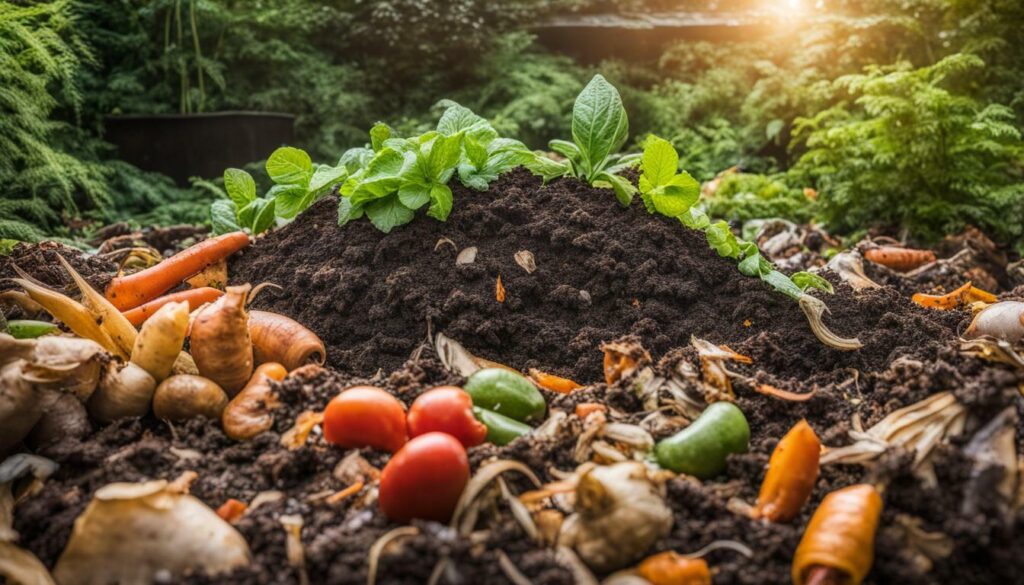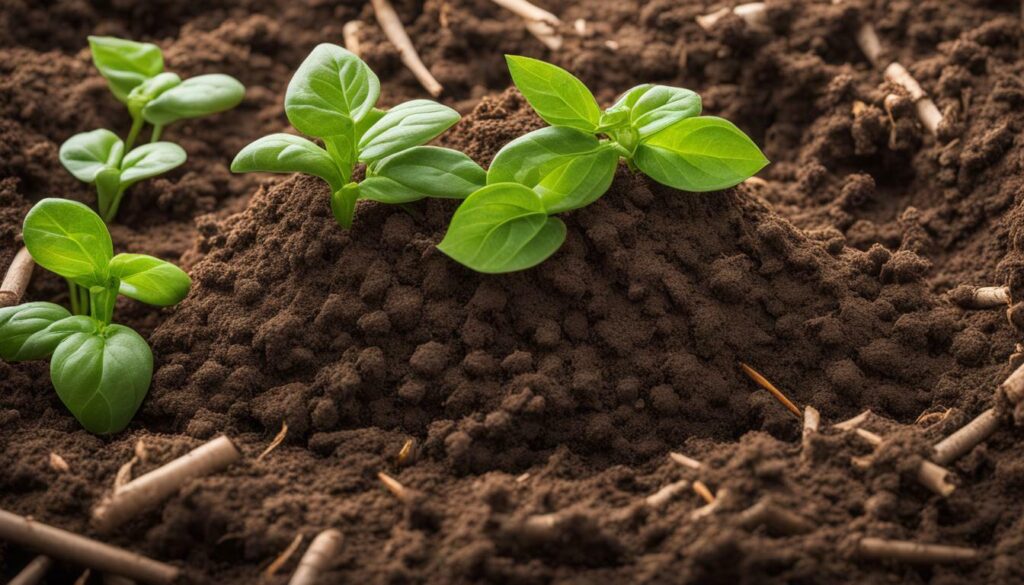Composting is an organic waste recycling method that has gained popularity in recent years due to its environmental benefits. The process involves breaking down organic materials such as food waste, leaves, and grass clippings into a nutrient-rich soil amendment. But does composting reduce greenhouse gases? The answer is yes.
Composting is a sustainable waste management practice that reduces the amount of organic waste sent to landfills, where it decomposes anaerobically and releases methane – a potent greenhouse gas. By composting, organic waste is diverted from landfills, and the resulting compost is used to enrich soil and promote plant growth.
Key Takeaways:
- Composting is an organic waste recycling method that breaks down organic materials into nutrient-rich soil amendment.
- Composting reduces the amount of organic waste sent to landfills where it decomposes anaerobically and releases methane, a potent greenhouse gas.
- The resulting compost is used to enrich soil and promote plant growth.
Understanding Greenhouse Gases
Greenhouse gases are gases that trap heat in the Earth’s atmosphere, contributing to the greenhouse effect and global warming. Examples of greenhouse gases are carbon dioxide, methane, and nitrous oxide. These gases are released into the atmosphere through various human activities, such as burning fossil fuels, deforestation, and agriculture.
The increase in greenhouse gases in the atmosphere has led to a rise in global temperatures, sea levels, and extreme weather events. To combat these effects, it is necessary to reduce greenhouse gas emissions and increase the use of renewable energy sources.
This is where composting comes in. Composting helps reduce greenhouse gas emissions by diverting organic waste from landfills, where it decomposes and produces methane, a potent greenhouse gas. Instead, composting turns organic waste into a valuable resource that can be used as a soil amendment, reducing the need for synthetic fertilizers and promoting healthier plants.
Greenhouse Gas Emissions Reduction
The reduction of greenhouse gas emissions is crucial to combat the effects of climate change. According to the Intergovernmental Panel on Climate Change (IPCC), reducing greenhouse gas emissions is necessary to limit global warming to 1.5°C above pre-industrial levels and prevent the worst impacts of climate change.
To achieve this goal, it is necessary to reduce emissions from various sectors, including energy, transportation, and agriculture. Composting can play a role in reducing emissions from the agriculture sector by diverting organic waste from landfills and reducing the need for synthetic fertilizers.
What is Composting?
Composting is the process of recycling organic waste materials and turning them into nutrient-rich soil. The process involves breaking down food scraps, yard trimmings, and other organic waste by combining them with microorganisms like bacteria, fungi, and worms, which break down the organic matter into a soil amendment known as compost.
The process of composting diverts organic waste from landfills, which are a significant source of methane emissions and contribute to climate change. Composting is an environmentally friendly way to manage organic waste and is a sustainable alternative to standard waste management practices.
The Environmental Benefits of Composting
Composting is a sustainable waste management practice that offers a range of environmental benefits. Through the process of decomposing organic waste, composting helps create nutrient-rich soil that can be used to boost plant growth and improve soil health. Additionally, composting can conserve water, reduce the need for synthetic fertilizers, and promote biodiversity.
One major environmental benefit of composting is its ability to divert organic waste from landfills, thereby reducing methane emissions. Methane is a potent greenhouse gas that contributes significantly to climate change. By composting instead of landfilling, organic waste is broken down in an aerobic environment, which reduces methane release.
Composting also helps reduce the amount of waste that goes to landfills, which can conserve valuable landfill space and reduce associated environmental impacts. Landfills require significant amounts of land, and they can pollute the air, water, and soil around them. By composting, communities can reduce the amount of waste sent to landfills and promote sustainable waste management practices.
Composting and Methane Reduction
Composting is a crucial climate change solution due to its carbon footprint reduction potential. Organic waste sent to landfills releases methane, a greenhouse gas that is 28 times more potent than carbon dioxide. However, composting organic waste can effectively reduce methane emissions.
Composting is an aerobic process that involves the breakdown of organic matter by microorganisms in the presence of oxygen. As the microorganisms consume organic waste, they release carbon dioxide instead of methane, which is a byproduct of anaerobic decomposition. Therefore, composting has the potential to reduce methane emissions by 99% compared to landfills.
Furthermore, compost produced from organic waste can be used as a soil amendment, which improves soil health, increases water retention, and reduces the need for synthetic fertilizers. This, in turn, enhances carbon sequestration in the soil, which can further contribute to mitigating climate change.
In summary, composting is an effective approach to reduce greenhouse gas emissions and promote sustainable waste management. It is a critical solution in the fight against climate change and should be widely adopted.
Composting vs. Landfilling
Composting is a sustainable waste management practice that offers several environmental benefits. In contrast, landfilling is an outdated method of waste disposal that has several drawbacks, such as methane emissions and resource waste.
The benefits of composting over landfilling are several. Firstly, composting reduces the amount of organic waste that goes to landfills, which minimizes the amount of methane emissions produced. Methane is a potent greenhouse gas that contributes significantly to climate change. Therefore, composting can lower a person or community’s carbon footprint and mitigate climate change.
| Benefits of Composting | Drawbacks of Landfilling |
|---|---|
| – Soil Health Improvement | – Produces greenhouses gases like methane |
| – Water Conservation | – Encourages overconsumption and waste |
| – Reduces Need for Synthetic Fertilizers | – Takes up valuable land space |
| – Promotes Biodiversity | – Releases toxic substances into the environment |
Composting can also improve soil health, conserve water, reduce the need for synthetic fertilizers, and promote biodiversity. This is in contrast to landfilling, which takes up valuable land space and encourages overconsumption and waste. Additionally, the waste in landfills releases toxic substances into the environment, which can harm nearby communities.
In conclusion, composting offers several benefits over landfilling, making it a preferred method of organic waste management. It is a sustainable waste management practice that can help to reduce greenhouse gas emissions and mitigate the impacts of climate change.
Case Studies and Research on Composting’s Impact
There is research to support the benefits of composting in reducing greenhouse gas emissions. For example, a study conducted by the United States Department of Agriculture found that composting can reduce carbon emissions by up to 60%. This is because composting prevents organic waste from ending up in landfills where it would decompose and release methane gas.
Another study, conducted by the Institute for Local Self-Reliance, found that composting can reduce greenhouse gas emissions by up to 4.4 metric tons per household per year. This reduction is equivalent to taking two cars off the road for one year.
Real-world examples also demonstrate the positive impact of composting. In San Francisco, the city’s mandatory composting program has led to a significant reduction in waste sent to landfills. Additionally, the city has seen a 15% reduction in its overall carbon footprint since the program’s implementation.
Another example comes from the city of Edmonton, which implemented a large-scale composting program in 2010. As a result of the program, the city diverts over 50% of its residential waste from landfills and produces high-quality compost that is used in landscaping and agriculture.
These case studies and research findings demonstrate that composting can have a significant impact on reducing greenhouse gas emissions. By diverting organic waste from landfills and using it for composting instead, we can reduce the amount of methane gas released into the atmosphere. This reduction is crucial in our fight against climate change.
Composting Challenges and Solutions
While composting has multiple benefits for sustainable waste management and reducing the carbon footprint, it also presents some challenges. Municipalities and businesses must overcome these obstacles to ensure successful composting practices and maximized impact.
Challenges
The major challenges associated with composting include:
| Challenge | Description |
|---|---|
| Odor Control | Composting can create unpleasant odors, which can be a major concern for nearby residents if not properly managed. |
| Contamination | Contaminants such as plastics and metals can be mistakenly mixed with organic waste, compromising the quality and safety of the compost. |
| Infrastructure Requirements | Composting requires specific infrastructure, such as composting bins, windrows, or in-vessel systems. These can be costly and require significant initial investment. |
Solutions
To overcome these challenges, municipalities and businesses can utilize best practices and innovative solutions. These include:
- Implementing odor control measures, such as covering compost piles regularly and using biofilters or other odor-reducing technologies.
- Establishing strict guidelines for organic waste collection and processing to minimize contamination. Educating the public and providing clear instructions for waste separation can also help.
- Partnering with private sector companies that provide composting services and infrastructure.
- Exploring new composting methods, such as using earthworms or black soldier flies to process organic waste.
By identifying and addressing these challenges, municipalities and businesses can realize the full potential of composting as a climate change solution and a sustainable waste management practice.
Composting at Home and Community Levels
Composting is not just for large-scale waste management operations. Individuals and communities can also benefit from composting by reducing their organic waste output and producing nutrient-rich soil for their gardens.
There are numerous benefits to composting at home and community levels. Firstly, it reduces the amount of organic waste that ends up in landfills, thereby reducing greenhouse gas emissions. Secondly, it promotes organic waste recycling, which conserves water and energy while reducing the need for synthetic fertilizers. Lastly, composting helps create healthier soils, as the rich organic matter produced can improve soil structure, water-holding capacity, and nutrient availability.
Composting at home is easy and requires only a small amount of effort. An ideal compost pile should consist of roughly equal parts of nitrogen-rich materials, such as food scraps and grass clippings, and carbon-rich materials, such as dry leaves and paper products. It’s essential to maintain proper ratios and moisture levels to promote aerobic decomposition and prevent odors and pests.
Community composting initiatives are also gaining popularity. These programs allow community members to bring their organic waste to a central location, where it is composted and made available for use in community gardens or given away to residents. These initiatives promote organic waste recycling while fostering a sense of community engagement and cooperation.
In conclusion, composting at home and community levels is a simple and effective way to reduce organic waste, conserve resources, and promote healthier soils. With minimal effort, individuals and communities can make a significant contribution to reducing greenhouse gas emissions while creating nutrient-rich soil for their gardens.
Government Initiatives and Policy Support
The importance of sustainable waste management practices like composting has been recognized by governments worldwide. Several initiatives and policies have been introduced to reduce the carbon footprint of waste and promote composting.
“Composting is a crucial part of reducing greenhouse gas emissions and promoting sustainable waste management. Governments can play a pivotal role in incentivizing composting adoption and promoting its benefits.”
One example of policy support is the European Union’s Landfill Directive, which aims to reduce the amount of biodegradable waste sent to landfills. The directive requires member states to establish waste management plans that prioritize waste reduction, reuse, and recycling. Composting is a key strategy in achieving these goals.
The United States Environmental Protection Agency (EPA) has also recognized composting as a critical component of sustainable waste management. The EPA’s Food Recovery Hierarchy prioritizes source reduction, then feed hungry people, then feed animals, then industrial uses, and finally composting. As part of its commitment to reducing greenhouse gas emissions, the EPA has set a goal to reduce food waste by 50% by 2030.
Furthermore, some governments have implemented regulations that require businesses and households to separate organic waste for composting. For example, in mandatory composting laws that exist in some states and municipalities, households and businesses are required to separate organic waste for composting. These regulations ensure that organic waste is not sent to landfills, where it would emit methane gas and contribute to climate change.
By supporting composting initiatives and policies, governments can play a crucial role in reducing greenhouse gas emissions and promoting sustainable waste management.
Conclusion
Composting is a sustainable waste management practice with numerous benefits for the environment and climate. As explored in the previous sections, composting reduces greenhouse gas emissions by diverting organic waste from landfills and minimizing methane release through aerobic composting. Additionally, composting improves soil health, conserves water, promotes biodiversity, and reduces the need for synthetic fertilizers.
While composting faces challenges such as odor control and infrastructure requirements, these can be addressed with appropriate solutions and best practices. Composting can also be adopted at home and community levels, contributing to reducing greenhouse gas emissions and promoting organic waste recycling.
Government initiatives and policies play a crucial role in promoting composting and sustainable waste management. Regulations and incentives provide necessary support for composting adoption and encourage carbon footprint reduction.
Does Composting Reduce Greenhouse Gases?
Yes, composting reduces greenhouse gases by minimizing methane emissions and promoting sustainable waste management practices. Its positive impact on the environment and climate makes composting a crucial solution towards a sustainable future.



